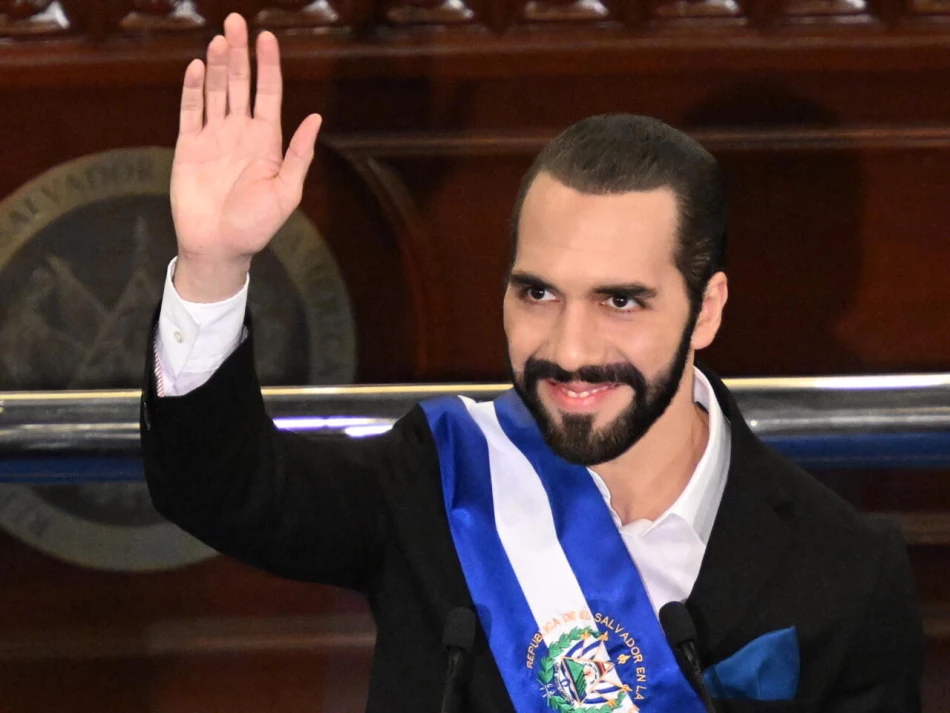
El Salvador Amends Constitution, Allows Dictator-President to Seek Lifetime Rule
El Salvador's Bitcoin President Secures Unlimited Terms in Constitutional Power Grab
El Salvador's parliament has approved sweeping constitutional amendments that eliminate presidential term limits and extend the presidency from five to six years, effectively allowing Nayib Bukele to remain in power indefinitely. The 57-3 vote, dominated by Bukele's overwhelming parliamentary majority, marks a decisive shift toward authoritarian governance in the Central American nation that made global headlines for adopting Bitcoin as legal tender.
A Parliamentary Steamroll with Minimal Opposition
The constitutional changes passed through El Salvador's 60-member National Assembly with remarkable speed and little debate. With 57 lawmakers loyal to Bukele's New Ideas party controlling the chamber, the outcome was never in doubt. The three opposition deputies who voted against the measure found themselves powerless to stop what critics are calling the death of Salvadoran democracy.
The amendments were introduced by Deputy Ana Figueroa from Bukele's party, who framed the changes as a "historic" step that puts power directly in the hands of voters. "Salvadorans, you alone decide how long you will support your president," she declared during the session.
Opposition Voices Drowned Out
Opposition Deputy Marcela Villatoro offered a starkly different assessment, telling parliament: "Today democracy died in El Salvador. They have removed their masks." Her criticism highlighted the rushed nature of the constitutional changes, which were presented to lawmakers just as the country entered a week-long summer recess.
From Bitcoin Pioneer to Authoritarian Strongman
Bukele's transformation from tech-savvy millennial leader to authoritarian figure represents one of the most dramatic political shifts in recent Latin American history. The 44-year-old president first gained international attention for his bold cryptocurrency policies, making El Salvador the first country to adopt Bitcoin as legal tender in 2021.
However, his domestic agenda has increasingly focused on consolidating power through judicial capture and constitutional manipulation. Bukele's party replaced Supreme Court justices in 2021, creating a compliant judiciary that later authorized his second-term candidacy despite existing constitutional prohibitions.
The Gang War That Built a Political Dynasty
Bukele's overwhelming popularity—he won 85% of votes in his 2024 re-election—stems largely from his brutal crackdown on criminal gangs that once terrorized El Salvador. His administration's state of emergency, implemented without traditional judicial oversight, has led to the arrest of tens of thousands of suspected gang members and achieved historically low violence rates.
This security success has provided political cover for increasingly authoritarian measures, including the harassment of journalists, activists, and human rights defenders. Dozens of media professionals and civil society leaders have fled the country amid the crackdown.
Regional Implications for Democratic Governance
El Salvador's constitutional changes echo broader democratic backsliding across Latin America, where populist leaders have used legal mechanisms to extend their rule. The move follows similar patterns seen in Venezuela under Hugo Chávez and Nicolás Maduro, and in Nicaragua under Daniel Ortega.
For international investors who initially welcomed Bukele's pro-business policies and Bitcoin adoption, the constitutional changes raise serious questions about long-term political stability and rule of law. While his administration has attracted cryptocurrency enthusiasts and some foreign investment, the concentration of power could deter traditional institutional investors who prioritize democratic governance.
The Trump Factor
The constitutional amendments come as Bukele positions himself as an ally of Donald Trump, potentially calculating that the incoming U.S. administration will be less concerned with democratic norms than its predecessor. This alignment could provide international legitimacy for Bukele's authoritarian drift, particularly if Trump's own administration adopts a more transactional approach to regional relationships.
What's Next for El Salvador's Experiment
The constitutional changes will shorten Bukele's current term to 2027, after which he can seek re-election without restrictions. This timeline suggests he's confident in maintaining his popularity through continued security improvements and economic policies that resonate with voters, even as democratic institutions erode.
For El Salvador's opposition and civil society, the constitutional amendments represent a closing window for peaceful political change. With term limits eliminated and the electoral system simplified to favor incumbents, future challenges to Bukele's rule will likely require either a dramatic shift in public opinion or external pressure from international partners concerned about democratic governance in Central America.
Most Viewed News

 Sara Khaled
Sara Khaled






